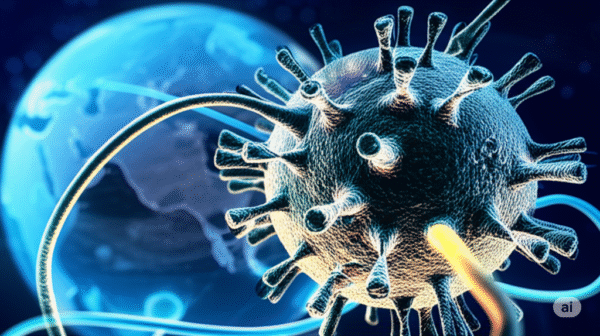COVID’s Next Move? The global health landscape is always changing. Even now, in mid-2025, the impact of infectious diseases remains significant. New COVID-19 variants are still very much felt. While the worst of the COVID-19 pandemic is behind us, the virus that causes it, SARS-CoV-2, keeps changing. These changes lead to new variants that present ongoing challenges for public health around the world. It’s crucial to understand these new developments. You should also be aware of other big global infectious disease threats. This knowledge prepares you to be ready.
Being aware of these threats means you can make smart choices to protect yourself and your community. We will explore the most recent information on the concerning COVID-19 variants that are spreading internationally. Furthermore, we will examine other major global infectious disease threats. These changes could have implications for your health and well-being. Staying informed from reliable sources is key in this ongoing effort.
The Evolving COVID-19 Landscape: New Variants Explained
The SARS-CoV-2 virus is a master of adaptation. As of June 2025, health organizations worldwide are still keeping a close eye on new COVID-19 variants. These changes in the virus can affect how it behaves in several important ways. For instance, some variants might spread more easily from person to person.
This increased spread can lead to outbreaks happening faster and covering more ground. Moreover, many new variants may not cause more serious illness. However, there is always a concern. A variant could emerge that leads to higher numbers of hospitalizations or even deaths. This continuous evolution means public health strategies must adapt quickly.
The constant emergence of new COVID-19 variants is a reminder for us. Vigilance is crucial. Adaptation is also one of our strongest defenses against future health challenges.
Another key area where variants can have an impact is immune evasion. Newer variants sometimes manage to get around the immunity people have gained from earlier infections or vaccinations. This particular ability means that we might need new versions of vaccines or additional booster shots to stay protected. Therefore, keeping up-to-date with vaccine recommendations is crucial.
Beyond COVID: Other Major Global Health Threats
While COVID-19 variants rightfully grab headlines, several other serious infectious disease threats are also active globally. These diseases require ongoing attention and strong public health measures. Ignoring them would be a mistake, as they can cause significant illness and death.
- Measles: Despite having an effective vaccine, measles continues to cause outbreaks in many parts of the world. This is often due to lower vaccination rates in some areas and people moving from one place to another. Its ability to spread very easily makes it a serious concern.
- Cholera: In areas where people lack proper sanitation, cholera outbreaks are still a real danger. These outbreaks are also a threat where there is no access to clean water. Natural disasters like floods are becoming more common with climate change. They can worsen these outbreaks by contaminating water sources.
- Avian Influenza (Bird Flu): This virus typically affects birds. However, there have been rare cases of bird flu, like certain H5N1 strains, spreading to humans. The biggest worry is if these strains develop the ability to spread easily between people. Such a development could spark a new pandemic. Monitoring these animal-borne diseases is extremely important.
- Antimicrobial Resistance (AMR): This is often called a “silent pandemic.” It’s happening when germs like bacteria, viruses, and fungi become resistant to the medicines that used to kill them. This means common infections become very hard, or even impossible, to treat. This global problem makes everyone vulnerable.
- Tuberculosis (TB): TB remains a leading cause of death from a single infectious agent globally. Drug-resistant forms of TB are also a major concern, making treatment more complex and lengthy. Efforts to detect and treat TB effectively are vital for global health security.
The Impact of Global Threats on Your Health
The ongoing evolution of COVID-19 and the presence of other infectious threats impact your personal health. They directly affect the well-being of your family. It’s not just about what governments and health organizations do; individual actions also play a significant role in reducing risks. Staying informed is your first line of defense.
Knowing about these threats empowers you to make informed decisions about your daily activities and health choices. For example, understanding how a new COVID variant spreads can help you decide when to wear a mask. It can also guide your decision to avoid large gatherings. Similarly, being aware of diseases like cholera can emphasize the importance of safe drinking water when traveling.
These global threats can affect healthcare systems. They may impact access to regular medical care. They can also increase the strain on hospitals. Therefore, taking preventive measures now can help reduce the burden on these systems later. Your proactive steps contribute to the health of the entire community.
Being prepared for COVID’s next move and other global health threats involves a combination of informed choices and practical actions. It starts with recognizing that personal health is intertwined with global health. Every effort you make to stay healthy contributes to overall community resilience.
One of the simplest yet most effective steps is maintaining good personal hygiene. This includes frequent handwashing with soap and water, especially after coughing, sneezing, or being in public places. Also, covering your mouth and nose when you cough or sneeze helps prevent the spread of respiratory droplets.
Staying updated with your vaccinations is another critical layer of protection. This means not just for COVID-19. This includes any recommended boosters for new variants. It is also essential for other preventable diseases like measles, flu, and tetanus. Vaccines are powerful tools in preventing widespread illness and reducing the severity of infections.
Global Efforts vs. Individual Responsibility: A Comparison
The fight against global infectious diseases involves massive international efforts alongside vital individual responsibilities. Both play crucial roles in protecting populations and preventing the spread of pathogens. Understanding how these two levels interact is important.
Here’s a comparison of global efforts and individual responsibilities:
| Global Efforts (Organizations, Governments) | Individual Responsibilities (You) |
|---|---|
| Surveillance & Early Warning Systems: Monitoring outbreaks worldwide. | Stay Informed: Get updates from trusted health sources (WHO, CDC, local health dept.). |
| Vaccine Development & Distribution: Researching, producing, and equitably sharing vaccines. | Get Vaccinated: Follow recommended vaccination schedules for preventable diseases. |
| Healthcare System Strengthening: Building resilient health infrastructure globally. | Practice Good Hygiene: Regular handwashing, respiratory etiquette (cover coughs/sneezes). |
| Antimicrobial Resistance (AMR) Strategies: Promoting responsible antibiotic use, R&D for new drugs. | Use Medicines Wisely: Only take antibiotics when prescribed, complete the full course. |
| Policy & Regulation: Implementing health policies, travel guidelines, and trade regulations. | Follow Public Health Guidance: Adhere to local health advisories, mask recommendations, and social distancing during outbreaks. |
Looking Ahead: Building Resilience: COVID’s Next Move?
The ongoing challenge of COVID’s next move is daunting. Other global infectious disease threats also highlight the need for continuous adaptation. Preparedness is crucial as well. We cannot predict every new variant. We also cannot foresee every emerging pathogen. However, we can build stronger, more resilient health systems and communities. This resilience comes from a combination of scientific advancement and widespread public health literacy.
Investing in research for new vaccines, treatments, and rapid diagnostic tools is fundamental. Scientists are constantly working to understand pathogens better and develop new ways to combat them. This ongoing innovation is our best bet against future health crises, providing us with new weapons in our arsenal.
Equally important is ensuring that everyone, everywhere, has access to basic healthcare, clean water, proper sanitation, and accurate health information. Addressing health inequities globally strengthens the entire world’s defense against infectious diseases. When health systems are strong in all corners of the globe, the risk of widespread outbreaks decreases significantly.
Conclusion: COVID’s Next Move?
COVID’s Next Move continues to be a central concern in global health. It emphasizes the ongoing threat of new variants. It also highlights other global infectious disease threats. Staying informed, practicing good hygiene, and embracing vaccination are key personal actions. We must work together to strengthen global health systems. Addressing health inequities is also crucial. These actions are vital in building a resilient future against these evolving challenges.
Also Read 👋
AI women’s health: Smart Health in Your Pocket?
Reference Article
Uptick in global cases of new COVID-19 variant, and other health stories
Call to Action
“Empower Yourself: Share this vital information with your loved ones and take proactive steps for a healthier future. Your informed choices protect us all!”
Disclaimer: This article is for informational purposes only. It is not intended to be a substitute for professional medical advice, diagnosis, or treatment. Always consult your physician with any questions. You should also reach out to other qualified health providers regarding a medical condition.
Discover more from I-PICKS
Subscribe to get the latest posts sent to your email.


